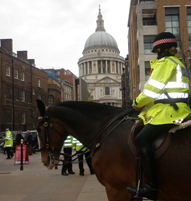Police in New South Wales are introducing a policing tactic pioneered in the UK, used to disrupt a range of crime and maximise public safety. Project Servator sees police, businesses, community partners and the public working together, and is in use around the UK, including London, after the City of London Police force (pictured) began it in 2014, developed and tested by the UK’s official Centre for the Protection of National Infrastructure (CPNI).
The tactic will see the deployment of visible and plain clothed police officers, who can be supported by specialist units. The deployments can happen anywhere and at any time and include police officers trained to spot the tell-tale signs of individuals who may be planning to commit a crime. Officers will engage more with the public while on patrol, including businesses, to raise awareness of Project Servator and encourage every member of the community to be their extra eyes and ears.
Project Servator has been gathering intelligence that has assisted Counter Terrorism Units across the UK; and has resulted in many arrests for a multitude of offences and is responsible for removing firearms, knives and drugs from the streets.
The NSW public can distinguish Project Servator patrols by the patch that officers will wear on their sleeve. Deployments will see police having conversations with members of the public, who are welcome and encouraged to approach police and assist in any way.
Investigations and Counter Terrorism Deputy Commissioner, Dave Hudson, said Project Servator adds to existing policing methods. “Project Servator has been implemented and refined over five years by experts in the UK, but the model is well suited to NSW. We have the benefit of learning from previous Project Servator operations conducted in the UK, which have resulted in hundreds of pieces of evidence being gathered in recent years, as well as arrests for various offences including firearms, drugs, and theft.
“While not all patrols will involve specialist units, Project Servator can – and will if necessary – utilise any specialist police resources.
“It’s important to note that this tactic is not targeting a specific type of crime, nor is it in response to a particular threat or concern. It is a way of detecting, deterring and disrupting those who may be planning to commit a crime, as well as making the public feel safe.
Metropolitan Field Operations Deputy Commissioner, Jeff Loy, said the patrols are intended to become business as usual. “Project Servator will serve as an all-inclusive, combined effort between the public and police in disrupting all levels of crime. The community can expect to see unpredictable, high-visibility police deployments at various locations, initially in Sydney but potentially elsewhere as well.
“Uniformed, plain clothes and specialist officers will be out in force and engaging with local businesses and people going about their daily activities. “I encourage people to take the time to talk to patrolling officers who will be easily identifiable with Project Servator signage and high visibility arm bands.”
City of London Police Assistant Commissioner Alistair Sutherland, the UK’s national policing lead for Project Servator, said he welcomed NSW Police to the ‘Project Servator family’.
“New South Wales are the first police force outside of UK policing to adopt Project Servator. They join 22 UK police forces in using the approach to disrupt a range of criminal activity, including terrorism, whilst providing a reassuring presence for the public.
“Project Servator is a powerful addition to existing tactics the New South Wales Police Force already use to keep the people of Sydney safe. We are delighted to be able to support them in bringing Project Servator to the southern hemisphere.”
NSW Police add that Servator has already seen results after deployments around the Sydney CBD in recent months. Officers patrolling major Sydney locations have identified a number of people and incidents that posed a potential danger. Patrolling police have detected various offences such as breaches of Apprehended Violence Orders (AVOs), possession of prohibited weapons, knives, and drugs in public places, truancy, and transport-related offences.
In Australia, contact Crime Stoppers: 1800 333 000 or https://nsw.crimestoppers.com.au.










